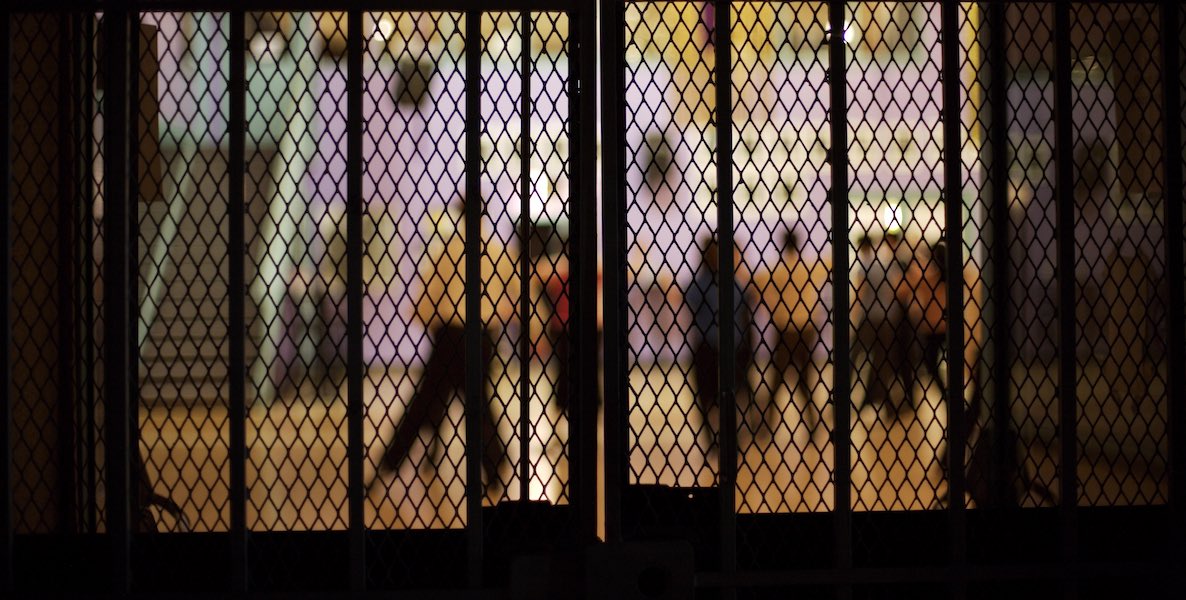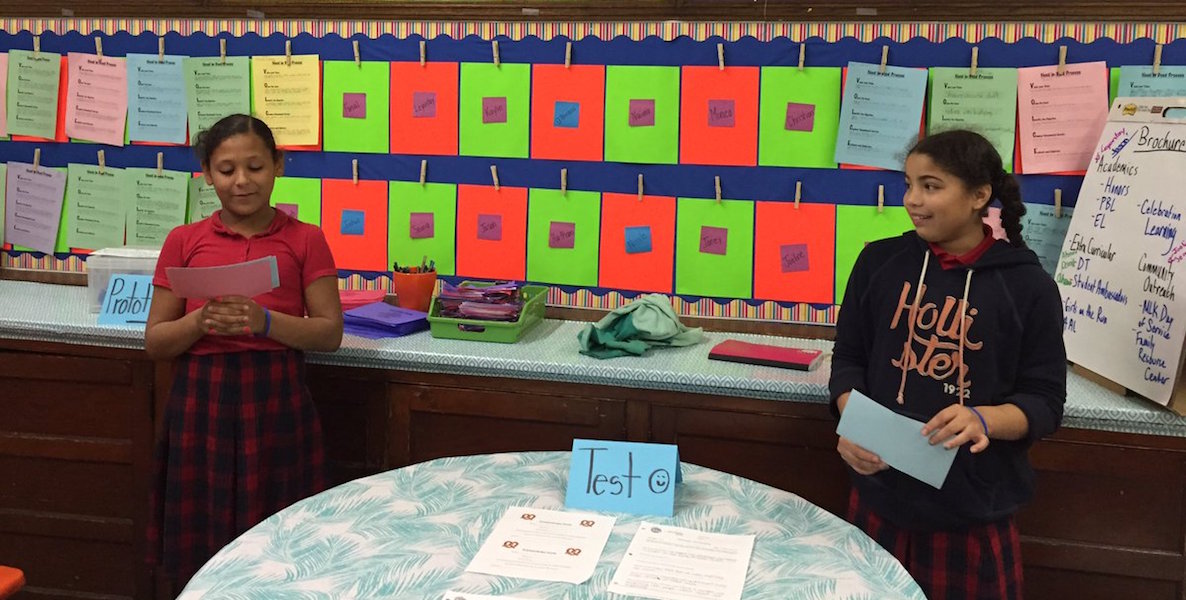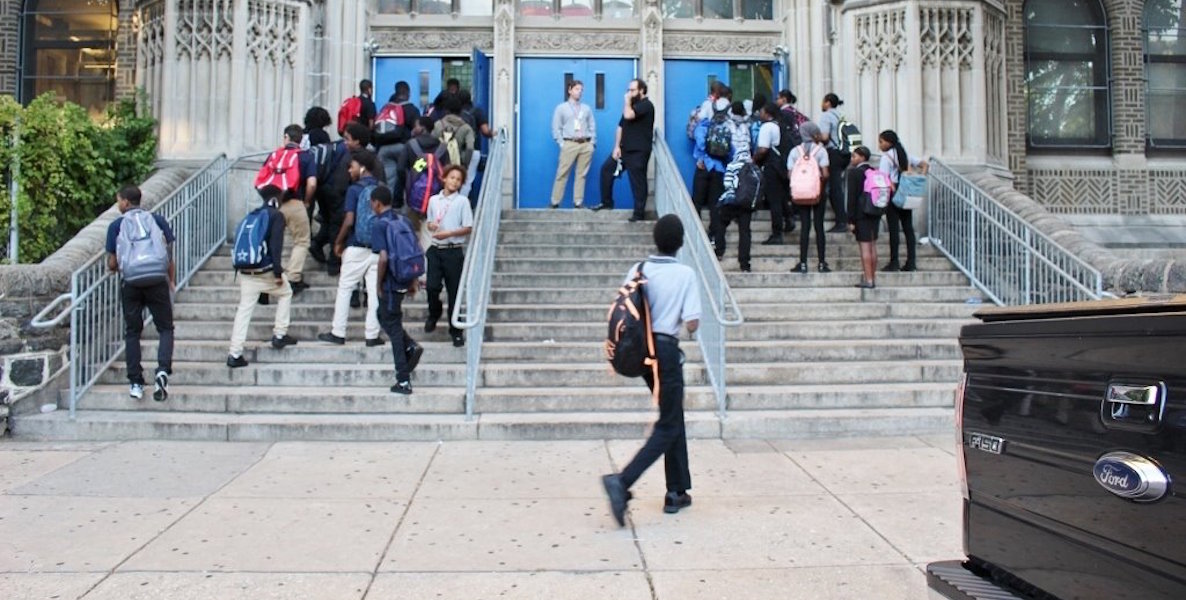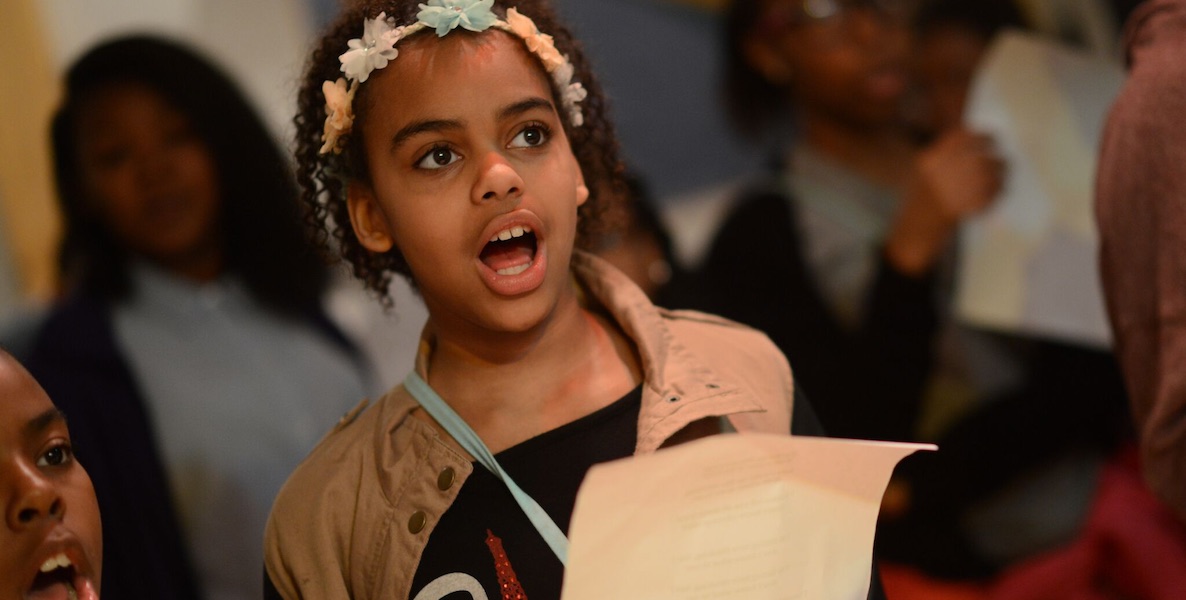“We are in a situation now,” Frank Machos, the Director of Music Education for the School District of Philadelphia, said in a recent interview. “If a principal opens a new program or we hire a new teacher, they are at the mercy of whatever resources have been left in place.”
This is true of many things in the school district, but particularly of music programs. Most Philadelphia schools do not have a full-time music teacher. Instead, they lay partial claim to an itinerant music teacher teaching hundreds of students at several schools over the course of the week. Even those who do have a full-time teacher often lack the resources to fully support a high-quality program and so depend on the pure grit and determination of that music teacher to pull things together.
![]() This learning gap was the genesis for LiveConnections, a nonprofit in residence at the music venue World Cafe Live, that bolsters students’ access to quality music learning, with free interactive music educational programs for school groups, and by sending professional musicians to work in schools. Since 2008, the program has worked with more than 30,000 2nd to 12th graders from more than 35 city schools—and it’s continuing to grow.
This learning gap was the genesis for LiveConnections, a nonprofit in residence at the music venue World Cafe Live, that bolsters students’ access to quality music learning, with free interactive music educational programs for school groups, and by sending professional musicians to work in schools. Since 2008, the program has worked with more than 30,000 2nd to 12th graders from more than 35 city schools—and it’s continuing to grow.
“We believe music is a human right,” says LiveConnections’ Executive Director, Melinda Steffy, who is a musician and artist herself. “It’s a fundamental part of how we express ourselves.”
LiveConnections was founded eight years ago by the force behind World Cafe Live, Hal Real and three partners. The venue was dark during the day when school is in session, they realized, and they were well aware of the struggles area schools face when it comes to music education. So they began to ask, What can we do?
“We’re not training students to be musicians,” says Steffy. “It’s much more about appreciation of music. Music is a really powerful tool for helping students understand other concepts—earn about culture, history, even technology. That kind of innovative thinking through music is something you don’t get anywhere.”
They talked to schools about what would best serve their needs. Could they bring their students to World Cafe Live for an afternoon field trip to learn music skills? At first, the response was disheartening. We just don’t have the budget, schools retorted. Many couldn’t even afford the cost of the buses to transport students from school to the venue. So the LiveConnections team realized they would have to change their model, making the whole experience, which they call “Bridge Sessions” as a nod to the idea of bridging the gap between school children and musicians, down to the nickel, completely free.
![]() They launched their Bridge Sessions in 2008, bringing distinguished musicians from the Philadelphia area to World Cafe Live 50 times a year. The 90-minute sessions, which tend to be grouped in October and November (they just launched for this year) and again in February and March, are for 150 students at a time, grouped by age. They are one part concert from musicians who hail from diverse cultures and traditions in Philadelphia’s vast music scene, including The Philadelphia Orchestra and Arab culture nonprofit Al-Bustan Seeds of Culture, and one part hands-on music education session. Throughout, the musicians are down on the floor level with the students, not on the stage, to eliminate barriers while they break down musical skills into chunks that students can really wrap their hands around. (These school group sessions can also be adapted for adults with physical and cognitive disabilities, which LiveConnections does at least three times a year.)
They launched their Bridge Sessions in 2008, bringing distinguished musicians from the Philadelphia area to World Cafe Live 50 times a year. The 90-minute sessions, which tend to be grouped in October and November (they just launched for this year) and again in February and March, are for 150 students at a time, grouped by age. They are one part concert from musicians who hail from diverse cultures and traditions in Philadelphia’s vast music scene, including The Philadelphia Orchestra and Arab culture nonprofit Al-Bustan Seeds of Culture, and one part hands-on music education session. Throughout, the musicians are down on the floor level with the students, not on the stage, to eliminate barriers while they break down musical skills into chunks that students can really wrap their hands around. (These school group sessions can also be adapted for adults with physical and cognitive disabilities, which LiveConnections does at least three times a year.)
“We’re not training students to be musicians,” says Steffy. “It’s much more about appreciation of music. Music is a really powerful tool for helping students understand other concepts—learn about culture, history, even technology. That kind of innovative thinking through music is something you don’t get anywhere.”
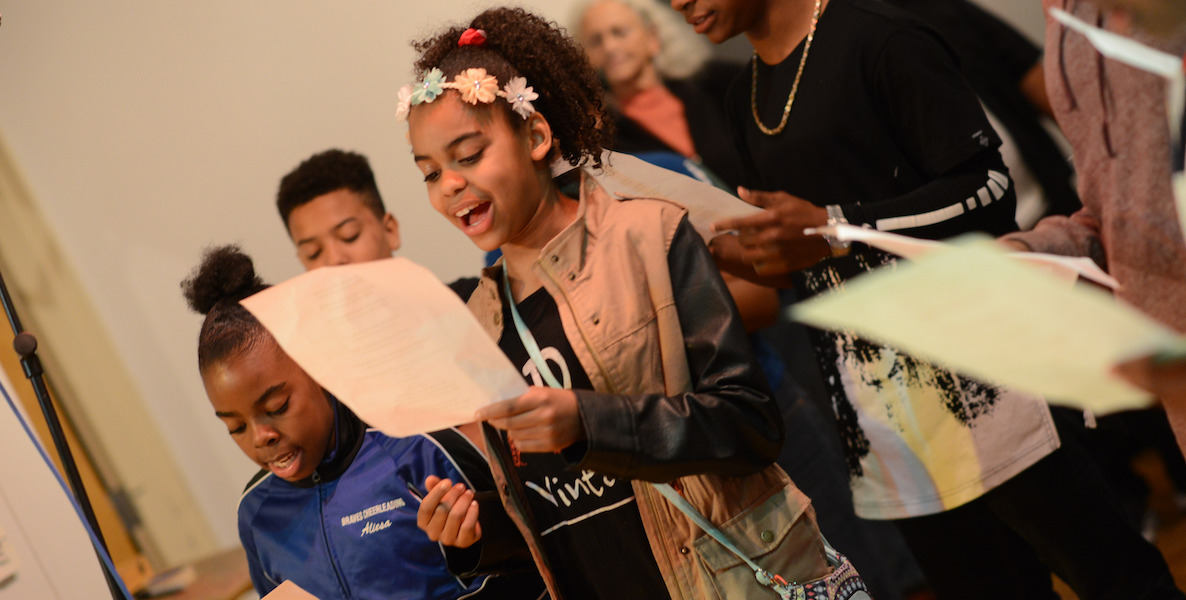
There are no specific qualifications for a school to take advantage of the program, though it has tended to focus on schools with greater need and schools located within city limits. LiveConnections works with traditional district and charter schools, and with schools that both have a full-time music teacher and schools that don’t. LiveConnections attends events for teachers and principals to spread the news about their programs, but most effective has been word of mouth, says Steffy.
LiveConnections is funded mostly through grants from foundations but also partly through KickStarter and a 10-day annual push to solicit individual donors, similar to a public radio membership drive.
In addition to the Bridge Sessions, LiveConnections sponsors Philadelphia artists to be in-residence at two schools per year to work on an in-depth project with students. Last year, the musician Andrew Lipke spend a year-long residency at Henry H. Houston School in Mount Airy. He and the students created an original 16-track album called “A Day in My Life.”
“Houston had been coming to our interactive Bridge Session concerts for a few years, and I was struck by the commitment and vision of their music teacher Ezechial Thurman,” says David Bradley, one of the co-founders of LiveConnections. Thurman and Bradley wanted to create an album that would capture the ideas and spirit of the school.
Poet and teaching artist Jacob Winterstein (a Houston alum) led poetry workshops with the whole school, while Lipke, Thurman and Bradley himself worked with a core group of 35 4th to 8th graders to develop songs; about 20 professional artists collaborated with the kids at different times.
“Every day when I wake up it’s another struggle,” sing a chorus of young voices on a particularly moving track. “Gotta see mom and dad go through another hustle.”
![]() The album allowed Houston students to travel to the National Constitution Center, make a song with the rock band HOME from Andrew Jackson Elementary School in South Philly, record at World Cafe Live and Studio 4 in Conshohocken and create a music video.
The album allowed Houston students to travel to the National Constitution Center, make a song with the rock band HOME from Andrew Jackson Elementary School in South Philly, record at World Cafe Live and Studio 4 in Conshohocken and create a music video.
In addition to the Houston school project, LiveConnections has run after school percussion camps at Christopher Columbus Charter School. They have also sponsored two-week summer camps at schools where they have built deep relationships.
“We’re flexible,” says Steffy. “We’re most focused on what does the school need from us and how can we make that happen?” This year they’ll be bringing their after school percussion program to three schools, and are looking at doing a twelve-week program in movement and social justice.
Last year, of 47 schools and organizations, 44 asked to return, and the program even added a few new ones. LiveConnections is totally full this season, Steffy says, and they’ll have to raise more money if they want to open their doors for more schools. “Once a school comes,” says Steffy, “they want to keep coming back.”
Last year, of 47 schools and organizations, 44 asked to return, and the program even added a few new ones. “Once a school comes,” says Steffy, “they want to keep coming back.”
Finally, LiveConnections also runs a curated concert series that takes the ideas of collaboration and risk on which the youth programs are founded and puts them on display for adults. The six concerts per year are unique: A curator with a deep knowledge of Philadelphia’s music scene comes up with a unique combination of artists to invite to the stage for a collaborative concert.
They commission new music, often music that doesn’t fit into any established genre. This year’s line-up promises “video game music composed by Curtis grads” and “a rock star string quartet making harmony with a theremin performer;” legendary jazz bassist John Patitucci to genre-defying Sybarite5. (Their next concert is on December 1).
![]() Having such an explicit emphasis on creating new and innovative music, boundary-pushing lyrics, and deep learning rather than rote memorization of musical skills is unusual for a music education organization functioning in an environment of financial scarcity.
Having such an explicit emphasis on creating new and innovative music, boundary-pushing lyrics, and deep learning rather than rote memorization of musical skills is unusual for a music education organization functioning in an environment of financial scarcity.
“I love how LiveConnections is both artist and student centered,” says Bradley. “We are always listening for the ways music can spark discovery—whether it’s a world premiere in our concert series or a collaboration between a group of students and a musician. That’s a very alive place to in which to work and learn.”
Steffy says LiveConnections hopes the organization allows students and musicians both to generate bold music that reflects an authentic creative practice that may not fit neatly into established ideas of music or performance.
“Music can be bigger and more inclusive than we think,” she says. “It has so much potential to do great things.”
Corrections: An earlier version of this story said Live Connections has worked with 5,000 students since 2008; it’s actually 5,000 per year, for 30,000 total. It also said the program has had a percussion group at Brejy Elementary School; that is a future plan.
Header photo by Jaci Downs


